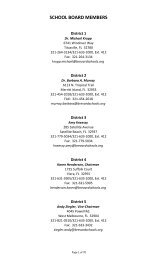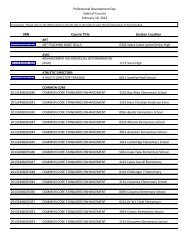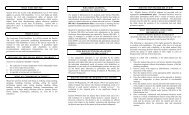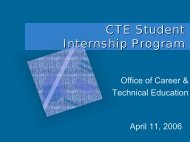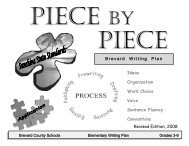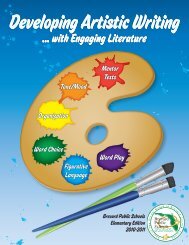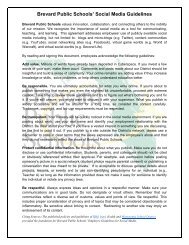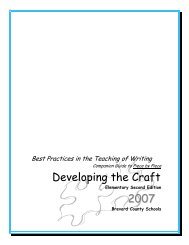2007-08 K-12 Comprehensive Research-Based Reading Plan
2007-08 K-12 Comprehensive Research-Based Reading Plan
2007-08 K-12 Comprehensive Research-Based Reading Plan
Create successful ePaper yourself
Turn your PDF publications into a flip-book with our unique Google optimized e-Paper software.
assessment, assess for student skill and strategy proficiency, and assess theeffectiveness of instruction. Principals and teachers utilize A3, Student Data Desktopand Dashboard district tools, as well as, the PMRN for reviewing student progressand achievement data.In addition to the 90-minutes of initial instruction, the classroom teacher, specialeducation teacher, reading resource teacher or other highly qualified school staffmember will provide daily immediate intensive intervention to identified children.School Literacy Leadership Teams develop a school wide plan for intervention (Walkto Intervention Model, Grade Level Intervention Blocks on Master Schedule, orthrough the use of support personnel: ESE, Title I or Instructional Assistants)based on student assessment data. Intensive immediate intervention (iii) instruction isprovided daily for students needing Tier 2 or Tier 3 services as outlined in MTSS(Multi-Tiered System of Student Support). Students who are identified as needingsupport by either scoring Level 1 or 2 on FCAT <strong>Reading</strong> or who are working belowgrade level in grades K – 3, have a set time for intervention reflected on their dailyschedule in addition to the 90-minute reading block. A Progress Monitoring <strong>Plan</strong>(PMP) or Individual Education <strong>Plan</strong> (IEP) documents an instructional plan foraddressing reading deficiencies. Small group instruction occurs daily for 20 - 45minutes based on student deficiencies and the severity of the gaps in reading skillsmastered. Teachers provide iii instruction with their students in groups of similarneeds and with no less than two students, as well as, no more than eight students inthat focus group.Brevard’s Elementary Programs Division has implemented intervention programs thathave been reviewed by The Florida Center for <strong>Reading</strong> <strong>Research</strong> (FCRR). Also,schools have purchased or been provided a variety of approved materials/programssuch as, but not limited to, Early <strong>Reading</strong> Intervention, Voyager Passport, SRA<strong>Reading</strong> Mastery, SRA - Open Court, SRA Corrective <strong>Reading</strong>, Waterford, Read 180,Earobics Comprehension Toolkit, Barton <strong>Reading</strong> and Spelling Program, StarLit,Early Success, Soar to Success, Text Talk, In a Word, 100 Book Challenge, SRALanguage for Learning, Macmillan/McGraw-Hill Triumphs, <strong>Reading</strong> A- Z,Classworks, FCAT Explorer, FCAT Galactic Library, FCAT Focus,PowerMediaPlus, Voyager Learning Ticket to Read, Successmaker, AcceleratedReader and <strong>Reading</strong> Counts.8. How will teachers provide student access to leveled classroom libraries of both fictionand nonfiction text focused on content area concepts implemented during the 90 minutereading block as a meaningful extension of the skills taught through the core readingprogram? Include the following: how these classroom libraries are utilized; how thebooks will be leveled; and the process for matching students to the appropriate level oftext.Teachers are encouraged to create classroom libraries that provide a wide variety ofgenres at multiple readability levels for student access during the literacy centerportion of the 90-minute block and throughout the day for promoting application ofreading skills and strategies. Macmillan/McGraw-Hill Treasures provides Timefor Kids articles enriching the exposure to nonfiction and real-world literature.Through grant funds, some schools have updated classroom libraries to include18 | P a g e




